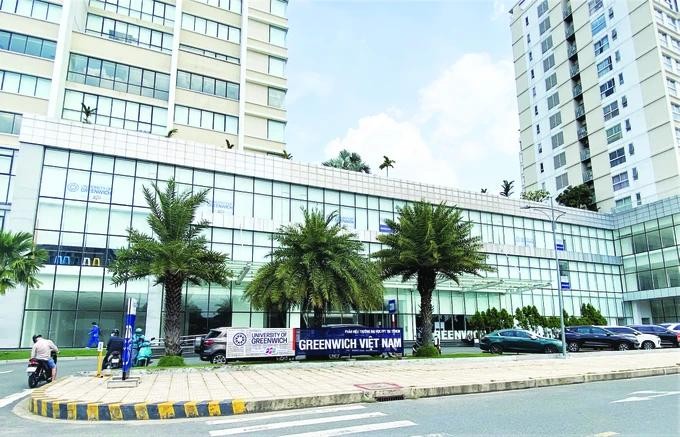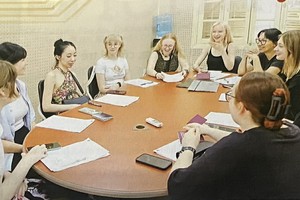
In order to satisfy the wide range of learning needs of the populace, international school models and foreign-linked general education, vocational, and higher education programs are currently expanding quickly both in quantity and diversity. Still, the quality differs even for anything that is classified as international.
To encourage social resources to pour in the development of education and training (including general education, vocational education, and higher education), the Party and the State have issued many preferential policies such as land allocation, land lease, tax exemption and reduction, and credit loans.
As a result, social contributions in the education sector has achieved many positive results, contributing to the development of the education and training sector, including the development of non-public educational institutions and international training programs. However, alongside the positive highlights, there are still many issues leading to unfortunate consequences.
The staff of the admission department at N.U. Primary-Secondary-High School in Ho Chi Minh City’s Phu Nhuan District introduced it as an international school system with a 100-year history of formation and development in Australia. From grades 1 to 12, students study the Australian national curriculum. After completing high school, students receive a globally recognized baccalaureate, which can be used to apply to the top one percent of universities worldwide in countries including Australia, the UK, the US, Canada, and Singapore.
Nonetheless, according to the details on the website of the HCMC Department of Education and Training, N.U. Primary-Secondary-High School is a private school that teaches the curriculum of the Vietnamese Ministry of Education and Training in addition to a foreign-linked program that was authorized by the Department of Education and Training of HCMC starting at the end of August 2022. The teaching program and the students' output criteria so plainly illustrate the discrepancy between the self-introduction of the school's admission staff and the publicly accessible data from the management agency.
Another school - the A.C. International School system (currently with six campuses in Districts 1, 3, 10, Binh Thanh, Tan Binh, and Thu Duc City) is publicly listed as a private school by the Ho Chi Minh City Department of Education and Training's information portal, without any mention of foreign partnership programs.
On the other hand, the curriculum is supported by the school's website and adheres to US academic standards. Notably, high school students have a choice between two unique programs that meet American standards. This begs the question of whether the foreign partnership programs that schools claim to be a part of are subject to regulatory body review or oversight. Why are the details supplied by the regulatory body and the advertisements on the school's website different?
Head Pham Dang Khoa of the Education and Training Department of District 3 has observed that there has been chaos in advertising on the websites of non-public schools. Parents, if not cautious and do not verify the information, can easily be overwhelmed by the information presented by the schools themselves. To rectify this situation, cooperation between the Department of Information and Communications and the Department of Education and Training is necessary, as the education sector lacks the authority to penalize the act of advertising false information on school websites.
The Ministry of Education and Training reports that there are currently more than 400 foreign partnership programs in higher education. Universities now have the power to choose whether to undertake joint training programs with overseas educational institutions thanks to the Higher Education Law (2018). However, a large number of partnership programs that are branded as international programs and charge tuition that can amount to hundreds of millions of Vietnamese dong are actually ill-organized, depending on temporary classroom setups and small-scale facility rentals.
According to Associate Professor Dr. Nguyen Thu Thuy, Head of the Department of Higher Education under the Ministry of Education and Training, inspections and audits have revealed numerous shortcomings and limitations in educational institutions. Some self-financing universities have been implementing international and foreign-linked educational programs but have not fully complied with the provisions of Decree No. 86/2018/ND-CP on foreign cooperation and investment in education. They have exceeded enrollment quotas and their actual teaching programs have deviated from those approved in the licensing dossier.
The inspectorate of the Ministry of Education and Training has implemented procedures mandating educational institutions to adhere to the approved dossiers, as well as administrative penalty records.
At the secondary level, the case of over 1,300 students at the American International School (AISVN) in Nha Be District, Ho Chi Minh City, who ended the 2023-2024 academic year prematurely in late April 2024 due to the school's inability to pay salaries to teachers and staff, has exposed a significant legal loophole in the management of non-public educational institutions.
The educational institution was halted on July 1, 2024 after a prolonged period of about three months, mostly because it failed to implement adequate measures to tackle the issues of finances and personnel.
Previously, the Ho Chi Minh City Department of Education and Training had repeatedly issued decisions to suspend enrollment for many non-public educational institutions that did not meet operational requirements. However, most of these were schools with enrollments under 1,000 students, tuition fees below VND100 million per student per year, and taught the Ministry of Education and Training's curriculum, so transferring schools did not disrupt students' learning process.
Meanwhile, the American International School teaches the International Baccalaureate program and has tuition fees that are among the most expensive for schools of the same type (ranging from VND280 million to VND725 million per student per year, depending on the grade level), making it difficult for parents and students to transfer.
As a body responsible for management, the Ho Chi Minh City Department of Education and Training lacks the jurisdiction to settle conflicts over loan agreements between parents and schools, so the welfare of pupils is not given priority.
Furthermore, numerous higher education and vocational educational institutions are actively striving to get international designation. However, the global standards for academic institutions, programs, and learners vary widely.
Numerous schools and universities around the country currently go by the label international school. For instance, RMIT International University, Hong Bang International University, Saigon International University, Eastern International University, Cetana PSB Intellis International College, Ho Chi Minh City International College, and Vietnam-USA International College are just a few of the numerous international schools in the Southeast alone; however, their international level or standards are still unknown because no school has placed in the top rankings worldwide.
A typical example is Cetana PSB Intellis International College, which belongs to Centena Vietnam Company Limited. The company invested in Vietnam in 2003 (according to a license from the Ministry of Planning and Investment dated September 18, 2003) and was granted a decision to establish the school by the Minister of Education and Training on June 30, 2015.
This college offers associate degrees in English, with degrees awarded by PSB Academy Singapore and the Cambridge Assessment International Education. During its operation, the school has rented facilities at least four times.
























